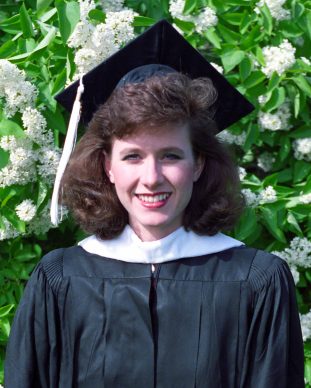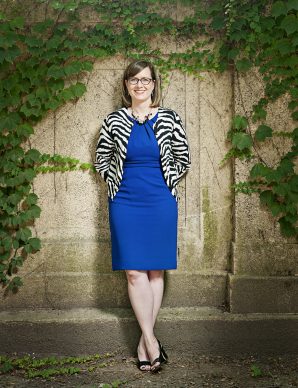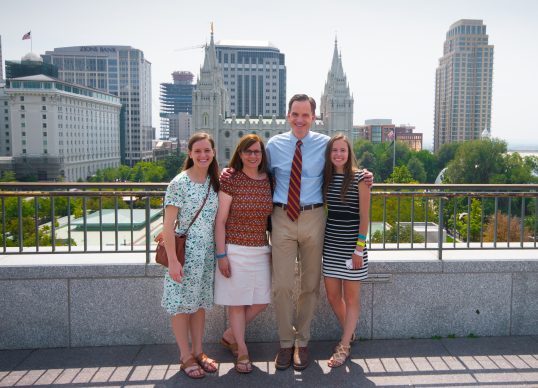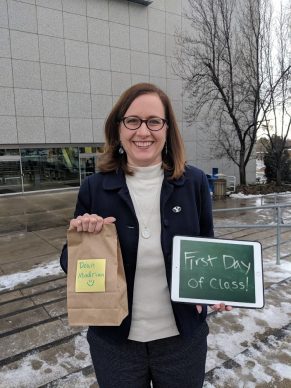Brigitte Madrian decided in eighth grade that she would get a PhD someday. She graduated from BYU with a degree in economics, then went on to fulfill her doctoral dream at MIT. Since then she has passed through the University of Chicago, the University of Pennsylvania, and Harvard University, to return finally as the first female dean of BYU’s Marriott School of Business. Her journey has included many tough decisions and trade-offs, but she has relied along the way on prayer and scripture, on careful planning with her husband and daughters, and on counseling with trusted mentors. Brigitte has been an academic trailblazer in the field of household finance, but also has been able to use her expertise to help struggling ward members manage their financial situations. In this interview she talks about what it means to be a mentor and a leader in a male-dominated field, and on how there’s no such thing as “having it all.”
What inspired you to pursue a PhD in economics? What got you on that path?
When I was growing up, my dad was a professor of sociology at BYU, and I don’t know why, but his job looked pretty fun to me. Maybe it’s because whenever he took me to work, I spent my time scrounging quarters out of his desk drawer and then sneaking off to the candy machine and rolling myself up and down the hallways in his wheeled office chair. I don’t think I really understood what the work part of his job was, but it seemed like a good job, and I knew he needed a PhD to have his job, and so I thought, “well, I’m going to get a PhD.”
I remember the precise moment when I made that decision. I was sitting in my 8th grade math class, and I knew I was going to get a PhD. That was great because for the rest of 8th grade and high school, I had this sense in my mind that I wanted to go to college and do well, so I could get a PhD.
What made you decide to get a PhD in economics, specifically?
When I started at BYU a few years later, I was planning to major in political science, but the political science department recommended that you take introductory economics. The fall semester of my freshman year, I took both the introductory political science class and the introductory economics class. I loved the economics class, but I wasn’t so crazy about the political science class! I don’t know whether it was the material or the teachers, but I decided freshman year of college to major in economics.

Brigitte graduating from BYU in 1989
Were there mentors at BYU who helped you take steps toward your PhD?
Yes. I feel fortunate to have had a number of really great mentors at BYU. Sometime in my sophomore year I remember a professor who taught one of my classes pulling me aside in the hallway one day and saying, “You should really consider going to get a PhD,” and I was able to say, “Well, yeah! That’s the plan. I’m going to do that.” It was really great having him tell me that I ought to be doing this. Because I had decided that I wanted to major in economics so early on, I had lots of opportunities to be a teaching assistant in different classes and work as a research assistant for different faculty, which meant by the time I graduated, I’d had a lot of experience that many students don’t start getting until graduate school.
The BYU economics department has a fantastic reputation for training undergraduates well and sending them off to graduate school to get PhDs, but they hadn’t had a lot of women go off to pursue graduate studies. I think I was definitely one of the first, so part of their interest was hoping that if I went off to get a PhD, I would come back to BYU eventually—which I did. It just took 30 years longer than they were hoping!
Your research focuses on household economics, is that right?
Yes, household finance is the name of my subfield.
What brought you to that interest? Was it something you did at BYU, or did it develop along the way?
No, it was something that developed later on. When I was at school, it wasn’t really a field within economics. The closest thing would have been personal finance—or consumer finance—which would have been taught in a home economics program, at least at BYU. And that’s not what I was doing. Economics has a subfield of finance looking at how firms get financial resources and fund their activities, but there wasn’t a recognized subfield of household finance. That subfield came to be defined in the mid-2000s, as a result of a number of faculty who were working on issues in other disciplinary homes within economics, but whose research was united by examining household financial decision-making and the markets involved in providing resources to consumers. I had been working on those types of issues for essentially my entire academic career, but I was affiliated with different subfields within economics. When this field arose on its own, I quickly became one of the—I don’t want to overclaim credit—but one of the leading figures in the field, in part because I’d done a lot of research there, in part because I was senior enough that I could exert some influence, and in part because I was located in Boston which meant that I was tightly integrated in the academic community. One of the key hubs for promoting new fields within economics is the National Bureau of Economic Research (NBER) which is located in Cambridge—halfway between Harvard and MIT—and I was there and had a leadership role over a several-year period, which was a lot of fun, actually.

Brigitte Madrian
That sounds like a really exciting time. I know that within academia, you’ve moved around a lot for different professional opportunities. What helped you when you made those career choices?
When I finished my PhD at MIT, my first job was in the Harvard Economics Department, but I wasn’t really happy in that job for a variety of situational factors. I decided pretty quickly it was better for me to be someplace else, and after a couple of years I moved to the University of Chicago to their business school. I was there for eight years. In academia, when you’re young and just starting out, after a few years schools will start calling you to see if you’re interested in moving—they’re trying to identify people who they could maybe get before they would come up for tenure at their home institution, so I started getting those types of calls after a few years. Now, the University of Chicago has a really long tenure clock. It’s ten years long.
Whoa! That is really long.
And my tenure clock got restarted when I moved from Harvard to Chicago, and then I had two kids while I was in Chicago and got a clock extension for both of my kids. That was really nice because I felt like I had the luxury of time. Having my clock restarted and then having the extensions with my kids on an already-long tenure clock, it took away a lot of time pressure, and so it meant that when people started calling I could ask myself, “Well, is this better or worse than staying at Chicago a few more years and seeing if another, better option comes up?” Neither my husband nor I thought we’d be in Chicago forever; our plan was always to stay there for a few years and then leave. We didn’t know what the next destination would be. I told the first few schools I got calls from that I wasn’t interested, and then the Wharton School at the University of Pennsylvania called and I thought, “Well, that’s a good enough option, I think I want to pursue that and see how it goes.” After I’d been in Philadelphia for a couple years, the Harvard Kennedy School called me up and asked if I would be interested in a position there and the answer was yes. So then we went back to Harvard, this time to the Kennedy School, not the economics department, and I loved that job. That was a really good fit for my interests and a fit for where I was professionally in my career. I was able to connect with financial companies in the New York area as well as collaborate on research with others in my field, and it was really easy to go to Washington and talk to policymakers about the policies around retirement savings issues, which is what my research was focused on.
I often thought that I would retire from the Kennedy School because I loved my job so much, but then a year and a half ago, the BYU Marriott School reached out and said, “We’re looking for a new dean, would you be interested?” And I said, “Well, I don’t know, but if you want to throw my name in the hat, go ahead.” I wasn’t looking to leave, it just kind of happened. The question was asked, “Would you be interested?” And here I am.
Before we talk about your move to the Marriott School, I wanted to ask about the decisions to move around and your family. I’m sure what your husband does—is he an academic, too?
No, my husband is a software architect. He luckily has a skill set that is in demand in lots of different places, especially in big cities. It has been a different process every time we’ve had the option to potentially move. My husband has been a consultant many times, and that makes the moves easier, since he could just switch from, say, the Chicago office to the Philadelphia office. But there are leaps of faith and there are always trade-offs.
What are some trade-offs you have made?
I had an opportunity many years ago to work in London for a year, and I wasn’t even going to ask my husband, “Do you want to move to London for a year?”, since I knew that was not feasible for us. I’ve been asked many times if I want to work in DC for a couple years, and I’ve turned them down, not because I don’t want to do them, but because the costs on the family side were too high. For my husband, there was a time he’d have been really happy to move to Seattle. He worked for Microsoft for over a decade, and being in Seattle would have been really exciting for him, but there weren’t good opportunities for me, so he never pursued that. Each couple makes trade-offs, and hopefully you can find middle ground that works for both of you.

Brigitte with her husband David and their two daughters
Let’s go back to your decision to leave your dream position at Harvard’s Kennedy School to become the Dean of the BYU Marriott School. How did you make that decision?
I recently gave a talk to the business school faculty about that very process. Making the decision was not easy. Like I said, I got an email from the BYU Marriott School saying that they were looking for a new dean and asking if I would be interested in being considered for the position. I was surprised by that email, since I was so happy in Boston and because I had only weak connections to the BYU Marriott School, but I wrote back saying that I’d consider it. At the end of March, I was in the final stages of the interviewing process, and after a long but exhilarating two-and-a-half day visit to BYU, I was feeling good about choosing the BYU Marriott School, and decided that if I were offered the job, I would in fact consider it. And then things got complicated. I returned to Boston and my dean called me into his office. His associate dean was stepping down and he wanted to extend me that position. I laid my cards on the table, saying that I was a finalist for the dean position at BYU and wasn’t quite ready to close the door on that opportunity. But, I was one of four finalists, so the odds were in his favor and accepting his offer wasn’t completely off the table. I asked if he would give me time to consider, and he said he would. But then, a few days later, BYU called to formally offer me the position of dean of the BYU Marriott School of Business. It was a really hard choice to make—they were both good options, two exceptional institutions, and two pieces of my heart.
Oh wow. Those kinds of decisions can be agonizing. What or who helped you to make that decision?
The answer came to me piecemeal over the course of the next week. I called former Harvard Business School dean and friend Elder Kim Clark for guidance on how I should evaluate these two different opportunities for academic leadership, one at Harvard, the other at BYU. In retrospect, I shouldn’t have been surprised at his answer. Rather than helping me think through the pros and the cons of these two options, he told me the answer was simple, that I should do what God wanted me to do. Well, that begged the question: what did God want me to do? Little more than an hour after talking to Elder Clark, I left for a women’s stake conference fireside where Sharon Eubank, First Counselor in the Relief Society General Presidency, was the keynote speaker. The theme for her talk was Esther 4:14. At this point in Esther’s story, Esther has been informed of the King’s order to exterminate the Jews, and her uncle Mordecai has implored her to intervene on behalf of her people. She tells him that going in to see the king without having been called for would put her life in peril. Mordecai responds to Esther: “For if thou altogether holdest thy peace at this time, then shall there enlargement and deliverance arise to the Jews from another place; and who knoweth whether thou art come to the kingdom for such a time as this?”
As Sister Eubank read this scripture, I had a strong and overwhelming impression that I, like Esther, had a choice. That whatever plan God has for BYU and the Marriott School of Business would be accomplished with or without me, but that I, like Esther, could choose to be a part of that plan if I wanted to. The next week I had another conversation with my dean, where he basically told me that the provost of Harvard had told him to do whatever was necessary to keep me at Harvard. I respect these two men—the dean and the provost—tremendously. And for the next 45 minutes, my dean offered me the sun, the moon, and the stars to stay at Harvard. I felt flattered. I felt loved. But as he implored me to stay, I had a clarity of thought I hadn’t expected: I knew that there was nothing he could say that would convince me to stay at Harvard. And that was when I understood with complete certainty that God’s plan for me was to come to BYU. It was my choice to be here at BYU, and it has been an exciting, challenging time so far.
You obviously have seen how your path and your talents connect with God’s plan on a large scale. How has the gospel interacted with your talents on a smaller scale? I remember reading about how you had a calling that was tailored to your individual talents to serve the needs of your ward. Can you tell me about that?
Yes, I was called as the “personal finance specialist.” Part of that calling was spent doing fifth Sunday lessons for combined priesthood and Relief Society about personal finance topics, and then part of it was trying to help families in the ward who were having financial problems. There was one family in particular that was facing pretty dramatic financial challenges. The mother was a single mother with two kids and the mom and both of the kids were disabled, so there were significant income constraints—what income the family had came from Social Security and other government programs—everyone had health issues, and at some point the bank was trying to foreclose on their home. I spent almost two years working with the family and working with an attorney in the ward to try to help the family keep their home during the middle of the financial crisis. It was especially important because the home was customized to help with the disabilities that people had in the family. Losing a home is costly for anyone, but for this family, the alternative options were extremely limited. And we were able to help them, and it was rewarding to use my professional abilities in a church context to bless other people in the ward. It also gave me interesting insights into the research I was doing and informed the way that I think about and teach my research topics.
That is really neat to see that intersection. Do you have any other ideas about how we can involve women’s and young women’s talents in different and creative ways in our congregations?
I think there are lots of ways the Church can use everyone’s talents in better ways. I have a lot of friends who are artists, yet our church buildings have standard Deseret Book paintings hanging on the walls. But you could have art not just by Church members, but local members in the congregation. I think there are lots of ways the Church could better use the talents of everyone in our local congregations.

Brigitte’s dogs, Mr. Darcy and Mr. Bingley
You are the first female dean of BYU’s business school. This is a really big deal! I know that there are many women in important roles at BYU, and that there are wonderful female faculty members there, but I think that for many people seeing a woman succeed and lead in a traditionally-male dominated field is so important. What are your thoughts about this experience, and what are your thoughts about encouraging Latter-day Saint women in leadership positions?
When I was interviewing, I knew that BYU had never had a female dean of the business school, and I knew that I was the only finalist who was a woman. I also knew that my getting the job would be much bigger than if they had given the position to one of the three other men. I knew it would have huge symbolic value to a lot of women in the Church, and I knew that symbolic value had nothing to do with me, per se, but more to do with the symbolism of a woman in a highly visible position that has historically been filled by a man—not just at BYU, but also in so many business schools across the country and world.
Have you seen that to be the case? Have people recognized that symbolism?
Yes, but even knowing that, I have been surprised at exactly just how much it has meant to so many of the students—especially the female students and female faculty and staff—to have me in this role. Like I said, I know it’s not about me. It’s not about anything I’ve done personally, but it’s important to be here to say to women. “If you want to major in business, it’s okay,” and to be a role model for someone who might want to do that. It’s exciting to be in a position of influence like that. It’s also a little bit daunting. You want to ask, “Do you realize that you’re not seeing how the sausage got made? You’re just seeing this highly-veneered thing that’s been Photoshopped.”
Still, I know how important it is to have female mentors, especially Latter-day Saint female mentors. What are your thoughts on your opportunity to mentor?
It is a wonderful opportunity. One thing that was really missing for me were female mentors and role models. I have had lots of fantastic male mentors and role models, but I didn’t have any women. For example, when I got pregnant the first time, I went to my dean at the University of Chicago and said, “Hey, I’m pregnant! What’s the maternity leave policy?” And he said, “Oh, I’ll have to get back to you on that.” And he got back to me two weeks later and said, “Well, you’re the first faculty member we’ve ever had who’s been pregnant, so we don’t have a policy!” On the other end, there were very few women at church who were working and having kids, so I felt like I was figuring out how to chart my own course without a map to guide me, because I didn’t have people to talk to and look at and ask questions about. I think it’s really neat to show people that they can be confident in what they want to achieve in their lives, or help someone think of creative ways to think about how to solve challenges or problems. I’m thrilled to do that. Progress happens slowly, but it happens, and I’m happy to be a part of it.

Brigitte’s first day as Dean of BYU’s Marriott School of Business
What advice would you have for women who are interested in going into business? What encouragement would you give women who are interested in that path?
I would say don’t be discouraged by the naysayers that you might hear out there in the world. There’s no reason why you can’t succeed in business if you really want to. The nice thing about business is that there are lots of different ways to succeed. I’ve been successful being an academic, not really business. But with business, there are full-time, high-powered jobs, with promotion and growth opportunities on one extreme, and then there are on the other end, start your own business, do what you want to do, set your own hours, sell what you want to sell kind of opportunities that have more flexibility, and then there are a whole lot of things in the middle. There are lots of ways to make it work, depending on what you want to do and depending on what your priorities are and what constraints you’re facing. The thing you have to recognize is that there is no way to have it all. Anyone who tells you that you can have it all is lying. There are always trade-offs. And you have to decide what matters most and what are you willing to give up for the things that are really important for you. The women who are working out there, like me and others, have made trade-offs on what types of things they are willing to give up on in their lives, and they feel like the benefits they get from working are important, and there are women who have decided that they want to stay home and raise their kids, and they’ve made a completely different set of trade-offs. I can’t tell you which trade-offs were more difficult to make, but I can tell you that every single one of us has made some sort of a trade-off in how we’ve decided to pursue our own life paths. I think you have to find what’s important, be willing to make the trade-offs, don’t second guess what you’ve given up—because if you gave it up for the right reason, then you shouldn’t be disappointed or second-guessing it. And don’t judge the trade-offs that other people have made, even if they’re not the ones—or especially if they’re not the ones—you would have made.
I guess that’s a very economically-centered way of looking at it, but also a faithful way and an empathetic way of looking at it. I have one last question. Are there any scriptures or gospel messages that have been helpful to you as you have started as the dean of the Marriott School? You mentioned the story of Esther. Is there anything else?
Well, over the last few months as I have contemplated coming to BYU, I have spent a great deal of time wondering about the strengths I have that I can bring to the table. I have also spent a lot of time wondering about how to overcome my weaknesses. Ether 12:27 is a scripture that has been in the front of my mind, which says, “And if men come unto me I will show unto them their weakness. I give unto men weakness that they may be humble; and my grace is sufficient for all men that humble themselves before me; for if they humble themselves before me, and have faith in me, then will I make weak things become strong unto them.”
In my experience there are three ways that God helps make “weak things become strong” unto us. The first is through concentrated effort to become better—we can acquire new skills and abilities, new strengths. I have weaknesses that I have been working very hard on overcoming with purposeful intent over the last few months. The second is that God sends us people who have complementary strengths to offset our weaknesses. I have seen that at the BYU Marriott School, and I am grateful for people here at the School who have strengths that compensate for some of my weaknesses. The third is that sometimes our strengths and our weaknesses are two sides of the same coin. In my case, coming from the outside is both an obvious source of weakness, and a potential source of strength. I believe that weakness is not a sign of failure, but an opportunity for personal growth.
At A Glance
Name: Brigitte Madrian
Location: Highland, Utah
Age: 52
Marital History: Married to David Madrian
Children: Two girls, ages 22 and 18
Occupation: Dean, BYU Marriott School of Business
Schools Attended: Brigham Young University (BA), Massachusetts Institute of Technology (PhD)
Favorite Hymn: Come Thou Fount of Every Blessing and Savior Redeemer of My Soul
Interview Produced by Megan Armknecht
